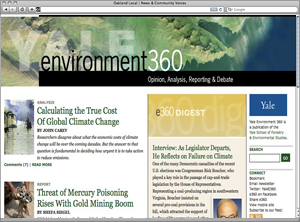With initial three-year funding from the William and Flora Hewlett and the John D. and Catherine T. MacArthur foundations, and support from Yale University as publisher, the site launched in June 2008, with reported features by prominent journalists including New Yorker staff writer Elizabeth Kolbert (on environmental tasks facing the next U.S. president) and author Bill McKibben (on whether we’ve reached a carbon-dioxide tipping point). That summer, the site hosted an exchange on managing human population size: will too many people consuming too much ruin the planet, as Paul and Anne Ehrlich argued, or has ‘the population bomb’ been defused, as British journalist Fred Pearce claimed? “That drew tremendous reverberations,” Cohn says, with significant pickup by mainstream outlets. A central goal of e360 is to shape public debate on environmental matters, both in identifying issues and weighing in on those questions; but not as much in breaking news, certainly not in the daily news cycle.
E360 publishes two new features each week, almost all written by freelancers, and two Yale interns ensure that each piece is fact-checked, a distinguishing standard in the online-only environment. Senior editor Fen Montaigne, a veteran environmental journalist, and web editor Kevin Dennehy round out the triad at e360, which keeps its site fresh with a daily digest of environmental news from other media sources, as well as new interviews, often with policymakers or academics, that are published every other week. Beginning last year, e360 began producing video reports with the multimedia studio MediaStorm. Leveling Appalachia: The Legacy of Mountaintop Removal Mining, won the 2010 National Magazine Award for best video in digital media. “The video reports are tremendously successful in garnering attention,” Cohn said. “That’s an area we’d like to make our mark in.”
Cohn hasn’t taken a formal survey of e360 readers, but traffic analytics show one third of the readers are from outside the United States. From the comments on stories and the e-mail addresses of those signed up to receive weekly updates promoting the site’s new material, Cohn knows he’s reaching scientists and policymakers, universities, and environmental organizations. “We’ve hit that audience and gotten great recognition,” he says. “We hope to reach general readers, too–don’t want just professionals. Our content assumes a strong interest, but not expertise.”
In 2009, e360 won the Online Journalism Award for best specialty journalism site in the small site category (100,000 to 1,000,000 monthly unique visitors). In part to reach a broader audience, Cohn struck a deal with the Guardian, which freely reprints e360 content with attribution and link-backs; he has a less formal content-sharing relationship with Reuters, as well. “Our first goal is to get the information out there,” he says.
The MacArthur and Hewitt foundations re-upped funding for a second three-year cycle, and Cohn has found supplemental support from wealthy individuals with ties to Yale. The site does not sell advertising and has no plans to start doing so. Although the model may evolve in coming years, for now, e360 is a sustainable, philanthropically supported voice on environmental issues of the day–a luxury Cohn recognizes is exceptional.
“We’re figuring out how to put out a publication on the Web that really does journalism, commentary and analysis, and to keep it sustainable,” Cohn says. “Our sense that there was the need for what we’re trying to do here has been vindicated by the reaction we’ve gotten and the audience we’re building. We want to build on that. I think our funding model will evolve over the coming years.”
 NEW HAVEN, CONNECTICUT — Yale Environment 360 is an online magazine that publishes long-form environmental journalism by prominent reporters, academics, and policymakers. A nonprofit backed primarily by two heavyweight philanthropic foundations, e360, as it’s known, isn’t subject to the market pressures squeezing many outlets. That leaves its full-time staff of three to focus on producing in-depth news, commentary, and analysis–and, more recently, extended video reports–on a wide range of environmental topics, from climate change and energy policy to coral reef bleaching and mountaintop removal mining. In 2007, James Gustave “Gus” Speth, then dean of the Yale School of Forestry and Environmental Sciences (and also a co-founder of the National Resources Defense Council), brought the concept to Roger Cohn, former editor of Mother Jones and Audubon, and e360 was born. “We wanted to do a serious job of reporting on a broad range of environmental issues and science,” Cohn says. “It was a niche that was not being served, something in between an academic journal and a green publication on lifestyle issues.”
NEW HAVEN, CONNECTICUT — Yale Environment 360 is an online magazine that publishes long-form environmental journalism by prominent reporters, academics, and policymakers. A nonprofit backed primarily by two heavyweight philanthropic foundations, e360, as it’s known, isn’t subject to the market pressures squeezing many outlets. That leaves its full-time staff of three to focus on producing in-depth news, commentary, and analysis–and, more recently, extended video reports–on a wide range of environmental topics, from climate change and energy policy to coral reef bleaching and mountaintop removal mining. In 2007, James Gustave “Gus” Speth, then dean of the Yale School of Forestry and Environmental Sciences (and also a co-founder of the National Resources Defense Council), brought the concept to Roger Cohn, former editor of Mother Jones and Audubon, and e360 was born. “We wanted to do a serious job of reporting on a broad range of environmental issues and science,” Cohn says. “It was a niche that was not being served, something in between an academic journal and a green publication on lifestyle issues.” 
